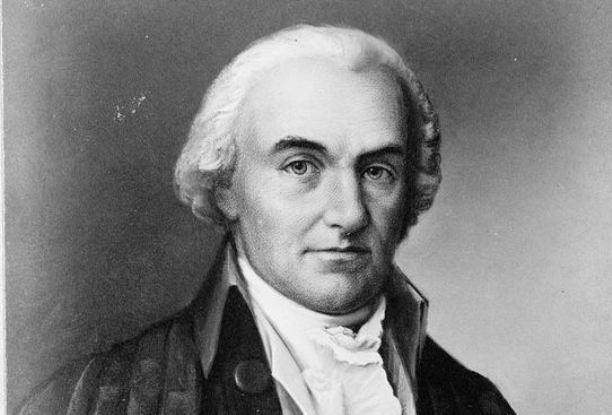The third Chief Justice of the Supreme Court, Oliver Ellsworth was revolutionary against British rule and a drafter of the United States Constitution. Born in 1745, Ellsworth was the son of a well-connected Connecticut family. He started studying at Yale but finished at Princeton, where he completed his theology studies. While at Princeton, he helped found the American Whig-Cliosophic Society along with Aaron Burr and William Paterson. He received his degree in 1776 and Phi Beta Kappa after two years. He later turned to the law and was admitted to the bar in 1771. He become prosperous in his own right and was recognized as one of the best lawyers in New England. He married Abigail Walcott in 1772, and together they had nine children.
He entered politics supporting the movement for independence. After 1776, he held a variety of local offices, including serving in the Continental Congress between 1776 and 1783. He served on the Marine Committee, the Board of Treasury and the Committee of Appeals. While serving as a member of the Committee of Appeals, he reviewed the decisions of state admiralty courts. In 1779, Ellsworth became a member of the Council of Safety for Connecticut, controlling all military measures for the state. In 1785, he became a judge of the Connecticut Supreme Court.
Joining the Constitutional Convention in 1787, Ellsworth supported the movement to create a stronger central government. He helped to engineer an agreement between the large and small states that later became known as the Great Compromise. This deal arranged for a two-house national legislature with proportional representation in the lower house, and two senators for each state in the upper house. He also served on the Committee of Detail, which prepared the first draft of the Constitution based on resolutions that had already been passed by the Convention. The Convention deliberations were halted from July 26 to August 6, 1787, while the Committee of Detail finished completing its task. Only James Madison himself and Gouverneur Morris spoke more than Ellsworth during those sixteen days.
Supporting Alexander Hamilton’s financial measures and various pro-British policies, Ellsworth was elected to serve in the first United States Senate. During this period, Ellsworth played a role similar to what is considered the Senate Majority Leader today. Ellsworth was the main author of the Judiciary Act of 1789, which established the structure and jurisdiction of the federal court system and created the position of attorney general. Ellsworth’s specification in Section 25 of Article III gave the federal government its only effective authority over state government at the time.
